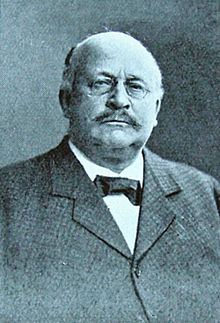P.A. Alberti
| Peter Adler Alberti | |
|---|---|
 |
|
| Born |
10 June 1851 Copenhagen |
| Died | 14 June 1932 (aged 81) Rigshospitalet's dept. C, Copenhagen |
| Cause of death | a traffic accident |
| Resting place | Assistens Cemetery (Copenhagen) |
| Known for | the Alberti scandal of 1908 |
| Title | Justice Minister of Denmark |
| Term | 1901 - 1908 |
| Predecessor | August Goos |
| Successor | Svend Høgsbro |
| Political party |
|
| Criminal charge | embezzlement |
| Criminal penalty | 8 years |
| Spouse(s) |
|
| Parent(s) |
|
10 June 1851
Peter Adler Alberti (10 June 1851, in Copenhagen – 14 June 1932, in Copenhagen) was a Danish politician and swindler, known for the Alberti scandal of 1908.
On 6 October 1876 in the Church of Holmen the 25-year-old barrister (overretssagfører) Alberti married the five years younger Eugenia née Møller.
They divorced and on 14 June 1906 in the Church of Our Lady (Copenhagen) he married the eleven years younger Anna Victoria Bendix née Sundberg, residing at Ny Vestergade 17-2. They also divorced.
On 1 November 1906 Alberti moved from Ny Vestergade to Sankt Annæ Plads 9-1 where he resided until his arrest.
On 20 August 1917 after his release from the State Prison in Vridsløselille he moved to Fælledvej 10 on Nørrebro.
Six months later he moved to Gammel Kongevej 141-2 and in 1921 he resided there as a lodger with a small family, where the daughter was a clerk in the ministry of Finance.
Alberti notarized a will on 1 December 1925.
In 1929 he resided again at Fælledvej 10-1, the following year he resided there as a lodger sharing the apartment with four working class women.
On 14 June 1932 while residing on the same address, Alberti died on Rigshospitalet's dept. C due to a traffic accident.
On 20 June 1932 he was buried on Assistens Cemetery (Copenhagen).
Alberti was a solicitor, the son of a well-respected liberal politician who had been a pioneer of the Danish savings bank system. This family background lead to his own career as the leader of Den sjællandske Bondestands Sparekasse from 1890 but very early he was also involved in speculations and doubtful economic transactions partly due to his ludomania. Later on it has become clear that he had been guilty of severe embezzlement from a very early stage. Perhaps in order to neutralise further attacks he entered politics in 1892 representing the right wing of the liberal movement. However he joined the united Venstre Reform Party in 1895, making himself the right hand of J. C. Christensen.
...
Wikipedia
